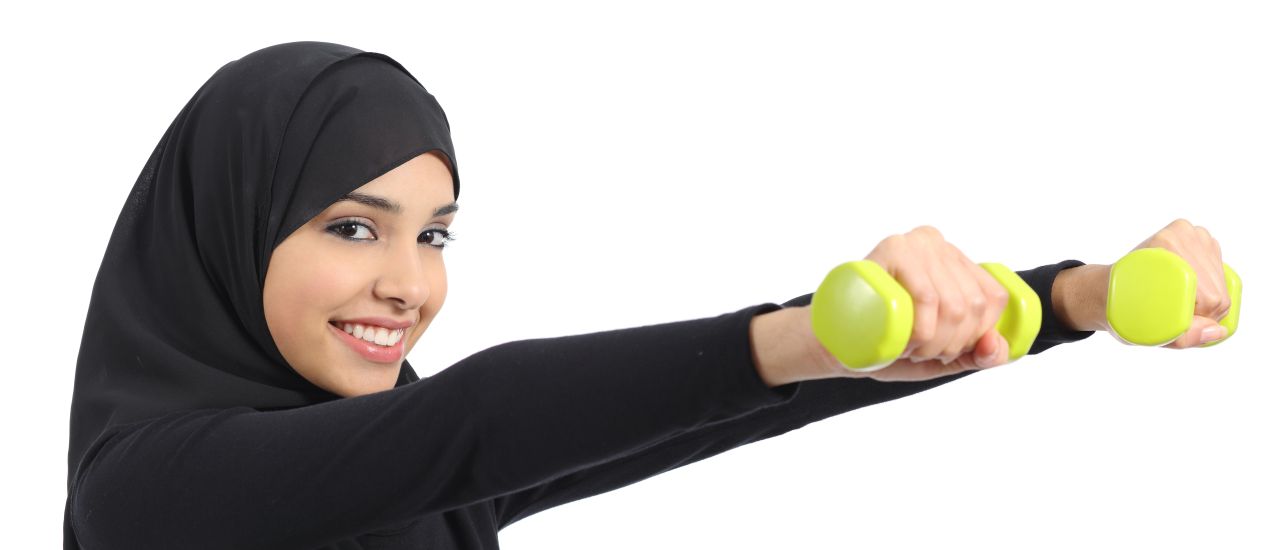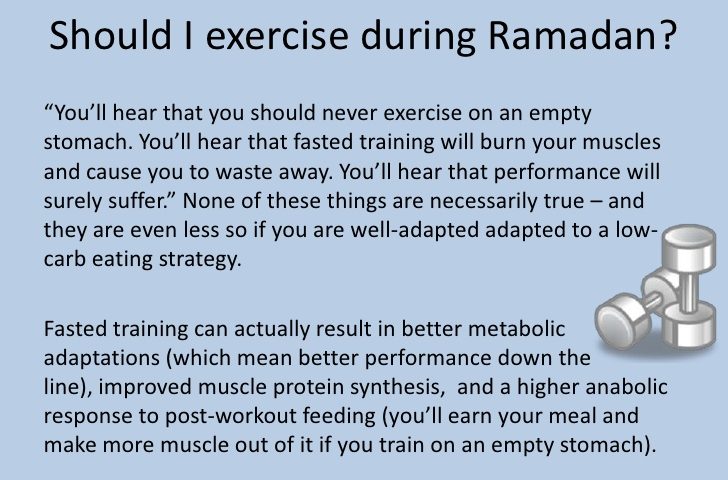
Health Benefits of L-Carnitine
30/04/2016
Lipo6 Black Ultra Concentrated & Amino Drive Review
28/06/2016
I am frequently asked, “How can I workout and eat properly while fasting?” Most people see the blessed month of Ramadan as a time when they will lose strength and muscle mass; some think they can only “maintain” themselves during this month, while many women actually gain weight! If you use some of the strategies I am about to share with you, you can make some of your best gains during Ramadan. It’s all about maximizing nutrient uptake, maintaining proper hydration, and modifying key fat-burning and muscle-building hormones in your favor-and of course PREPARATION – if you fail to plan, then you plan to fail! Plus, how can you truly maximize this month spiritually if your body is sick, tired, and your mind isn’t sharp?
First of all, let’s look at what happens to your body during Ramadan. While you are fasting, you become more dehydrated at rest – but actually less than if you had exercised aerobically for over an hour (so exercise causes greater dehydration for that time period versus fasting). Your main metabolic fuel source for bodily function during fasting is mainly fat, which is a good thing. So the goals during Ramadan are to maximize metabolism (even though your metabolism will slow down due to less frequent meals); preserve and enhance as much lean muscle mass as possible (which will inherently increase metabolic rate and allow you to burn more calories at rest); and maximize your workout (both cardio and weight training). During Ramadan, depending on your goals, I really recommend that you limit cardio to 2 days a week at the most. This is again to preserve as much lean muscle tissue as possible. There is actually research showing the health benefits of fasting. It is truly a physical purification. According to a study published in the reputable European Journal of Clinical Nutrition, the researchers concluded “no detrimental effects on health have as yet been directly attributed to negative water balance at the levels that may be produced in Ramadan.”Other research has actually shown cardiovascular benefits of fasting during Ramadan – that is, IF you can avoid the IBS. No, that’s not irritable bowel syndrome – it’s the dreaded Iftar Binging Syndrome! It is vital to eat moderate to small meals even after iftar.
Training Times

Ok, enough of the background, let’s get to the meat of it! I am going to set the record straight here. The best time to do a weight-training workout is NOT while fasting. This can create way too much muscle breakdown and cause a significant rise in the catabolic hormone cortisol. Training while in a state of dehydration can decrease strength significantly. In fact, research indicates that dehydrating a muscle by as little as 3% can cause a 12% loss in strength. Training while you are fasting can actually be more detrimental than beneficial! The best time to weight train during Ramadan is after taraweeh prayers at night. This will ensure that you will have several meals and plenty of water in your system before going to the gym. This will also allow you to consume your all-important post workout meal or shake which is essential muscle growth which leads to fat loss. If this is too late then the next best time to weight train is about 1 hour after iftar before tarawih prayer. You could do a short but intense 30 minute workout. The best time to do cardio work for maximum fat loss is before suhur – yep, that’s the truth. Of course, most people I know will not want to get up at around 3:30am and do cardio! If you CAN pull this off then the best thing to do is get up and drink plenty of water with a cup of coffee, green tea, or oolong tea, wait 30 minutes and perform 30-45 minutes of moderate intensity cardio work like a brisk walk on a treadmill. If this is out of the question for you, then the next best time to do cardio is approximately 30-45 minutes after a “light” iftar (I will define this shortly). Short, high intensity cardio like sprinting is actually great to do during Ramadan. It takes less than 10 minutes and provides maximum benefit in terms of fat burning and lean muscle preservation! This isn’t “driving Miss Daisy” cardio – it’s very intensive: an example would be sprinting for 20-30 seconds at full speed (like a crazy dog is chasing you!) and then walking for one minute. Do 4-5 cycles like that and you’re good! Start slow, of course, and work your way up.
So now you know when to train, it’s time to learn what to eat and drink (think water, water, and more water!
Suhoor (The Pre-Dawn Meal)
For suhoor, it is imperative to drink plenty of water, eat a good blend of protein, carbohydrates, and essential fat. That’s right, “good fats” have many fat-burning and muscle-building properties, and their importance is even greater during Ramadan. Some good suhoor foods include:
|
It is important to take a solid multi-vitamin, multi-mineral supplement with suhoor as well to make sure daily minimum requirements of key nutrients are met. One good source for women is the Women’s Blend by Super Nutrition and a good one for men is Opti-Pack by Super Nutrition. Taking extra vitamin C and vitamin E can also be helpful. A great product is Emergen-C from Alacer. It is very important to watch your sodium intake at this time as high sodium can cause greater dehydration plus increase thirst during the day – not good for fasters. Avoid high sodium foods like soups, sauces, condiments, gravies, high sodium bread products, and canned meats. Of course eating fried foods and heavy oil items can cause heartburn and problems for you all day so it is best to avoid those if possible!
Iftar (Sunset Meal)
This is a key time for rehydration. The wisdom in Islam is never ending. We break our fast with dates and water but if you investigate this nutritionally, you will see that dates are very unique in their nutrient content. They contain very high levels of potassium (much more than a banana), a key re-hydration mineral and a special carbohydrate blend that enhances hydration above and beyond water alone. They contain a special blend of glucose and fructose for short and long term energy. They also have a special nutrient called beta D-glucan that is a soluble fiber that can enhance satiety and digestive health. So basically when you eat a date and water for iftar your body gets hydrated again much faster than with water alone (this is a complex topic but I don’t want to bore you with the details – You can think of dates and water as a very advanced form of Gatorade). In fact, clinical research published in the International Journal of Food Science and Nutrition entitled “The fruit of the date palm: its possible use as the best food for the future?” concluded that “dates may be considered as an almost ideal food, providing a wide range of essential nutrients and potential health benefits.”
You should also eat some quality protein at iftar time as well. I would first recommend three dates. For men, I recommend a meal replacement protein powder like Protein Rush from VPX Sports, Lean Body byLabrada, or Eat-Smart MRP from iSatori and for women, one scoop of a protein powder like Pro-Blend 55, Eat-Smart MRP from iSatori, and Low Carb protein from MRM. Of course, drink plenty of water – in fact, keep a water bottle with you at all times after sunset! Then 1-1.5 hours later have a food meal (or follow the schedule above for cardio). Then during taraweeh, depending if you pray 8 or 20 rak`at, have a protein bar (like Power Crunch) or ready-to-drink protein shake in the middle (not while you are praying of course!); or you can have another small protein and complex carbohydrate meal after the 8 rak`at. If you have a protein bar, drink plenty of water and then go train for about 30-45 minutes. For women, you can actually do 20 minutes of cardio and 20 minutes of weight training at this time. For men, you can take a BCAA (branched chain amino acid) product like BCAA-G from MRM before, during and right after the workout to preserve lean muscle. After the workout, also have another nutrition shake with plenty of water. Eating small meals at night can trick your body into speeding up metabolic rate (not to mention increase nutrient absorption and stabilize insulin and blood sugar levels). Your body loves homeostasis and wants to maintain a certain balance – you literally have to shock it constantly to lose fat and gain muscle over the long run! There is so much wisdom in “Eat and drink but not to excess” and we should try and follow that especially during Ramadan.

Sample Ramadan Meal Plan for Fat Loss and Muscle Gain
*This plan is for a 170 lb MALE, please adjust amounts for bodyweight
Suhoor:
|
Iftar:
|
Sample Ramadan Meal Plan for Fat Loss and Muscle Gain
*This plan is for a 130 lb FEMALE, please adjust amounts for bodyweight)
Suhoor:
|
Iftar:
|
For cardio workouts: Do cardio 45 minutes after this meal for 30-45 minutes at a moderate pace or do a sprint workout if you have less time and then have the next meal before taraweeh. Have a cup of green tea, Oolong tea, or coffee with iftar on cardio days.
For weight training days: Eat another food meal before taraweeh like chicken breast (or baked salmon), brown rice and some veggies OR baked fish (salmon, tuna, orange roughy, or mahi mahi), sweet potato, and a garden salad or some steamed vegetables.
Drink plenty of water during taraweeh. Go to the gym after taraweeh. (If you pray 20 rak`at, have a protein bar in the middle of prayer). Drink plenty of water during the workout. For men, you can even have Accelerade or Powerade or another sports drink during the workout.
After the workout, have another Nutrition Shake and lots of water of course. Then sleep 45 minutes later or stay up all night eating and working like I do!
Following these simple workout and nutrition tips can really help you make great gains during this blessed month. May Allah help give us patience and strength in this month and throughout the year and make us strong mentally, internally, spiritually, and physically!

Top 5 Healthy Foods to eat During Ramadan
|
Article by IslamicCity.Org

